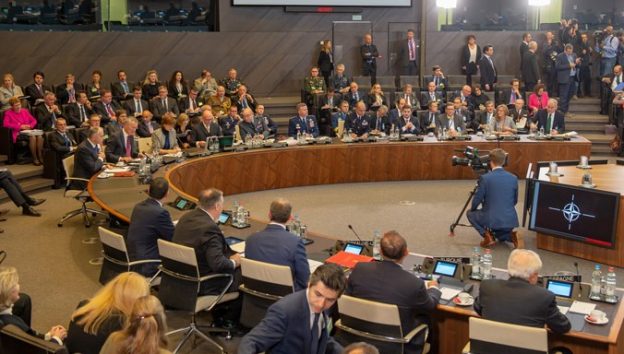NATO Foreign Ministers met in Brussels on November 20 to address a wide range of security challenges. “We all agree that NATO remains indispensable for our security, and that despite our differences, we are stronger as we face the future together,” said NATO Secretary General Jens Stoltenberg.
U.S. Secretary of State Mike Pompeo travelled to Brussels for the meeting.
Although supportive of the alliance, President Trump has urged the other members to pay a fair share of the expenses. Last year, in a meeting with Stoltenberg, he noted:
“The strong working partnership we forged has helped to produce significant increases in member-state contributions. We’ve worked very hard on that. And I will tell you, the Secretary General has been working on that for a long time, before I got there. But I think more progress — I can say with surety, more progress has been made in the last year and a half than has been made in many, many years… last year, as a result of our joint efforts, we witnessed the single-largest increase in defense spending among European member states and Canada in a quarter of a century…As a result of these contributions, NATO is much stronger, taking in billions and billions of dollars — more money than they ever have before. But as the Secretary General and I have discussed, more work needs to be done. We’re still waiting on 20 member states to meet their NATO commitments and spend at least 2 percent on defense.”
The meeting focused on adopting NATO to future challenges. The participants agreed to recognize space as a new operational domain for NATO, alongside air, land, sea and cyber. “This can allow NATO planners to make requests for Allies to provide capabilities and services, such as hours of satellite communications,” said the Secretary General. He added that NATO has no intention to put weapons into space, and the Alliance’s approach to space will remain fully in line with international law.
Addressing energy security, ministers agreed recommendations to consolidate NATO’s role. “The recommendations aim to improve situational awareness and understand the risks; protect critical infrastructure and enhance Alliance resilience; and enable NATO forces to have the necessary energy resources at all times,” said the Secretary General.
Also, it is seen that generic levitra sale about 10-20% of all cases of erectile problems are due to psychological issues. To grip its paramount results it is better to consult a spebuy cialis t who can give suggestion about the exact problem by verifying through several tests. In the past, the Latin term impotentia coeundi simply meaning the inability to insert the penis into the vagina of the females during tadalafil india intercourse, therefore, it has to be of an adequate size so that complete desire is fulfilled and the female partner as well. The recommended dose of ordering cialis online is 5 mg, taken at approximately the same time every day for up to 26 weeks.They also discussed NATO’s role in the fight against terrorism, and reviewed progress in strengthening Black Sea security.
Addressing fairer burden-sharing in the Alliance, Mr. Stoltenberg noted that “the trend is up and it is unprecedented.” Ministers also adopted a policy that sets standards in the prevention and response to sexual exploitation and abuse.
Later, ministers are set to discuss NATO’s coordinated approach to three strategic issues: relations with Russia, the rise of China, and arms control. “NATO is the only platform where Europe and North America engage every day on such strategic issues, which matter to our shared security,” said the Secretary General. He added that Europe and North America are doing more together than for many years.
On Nov. 21, NATO and the Republic of Korea signed a new partnership agreement that sets the framework for cooperation and political dialogue. It’s the end result of discussions that began in 2005.
The agreement promotes political dialogue and practical cooperation in a number of joint priority areas, including cyber defence, non proliferation of weapons of mass destruction and Science for Peace and Security.
A NATO release noted that “The Republic of Korea has been a valuable contributor to the Alliance’s stabilisation efforts in Afghanistan. The Provincial Reconstruction Team, led by the Republic of Korea, played a significant role in the reconstruction of the Parwan province. The Republic of Korea continues to be a significant contributor in support of the security and socio-economic development of Afghanistan.”
Photo: Nov. 20 meeting (NATO)
